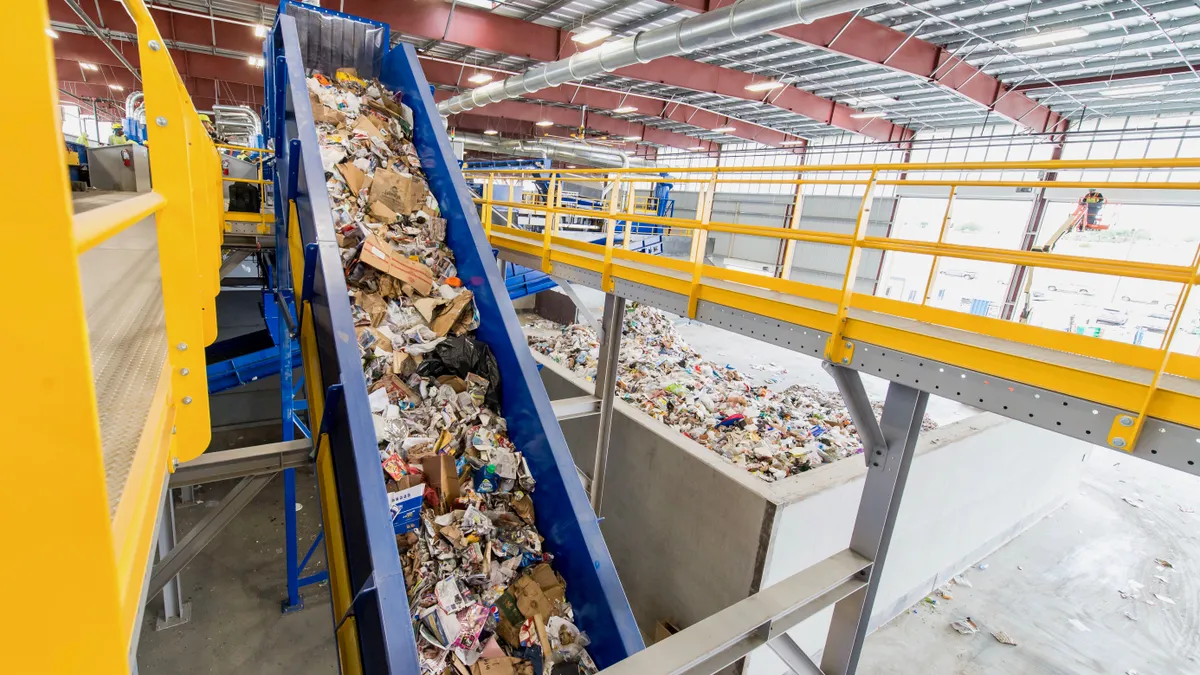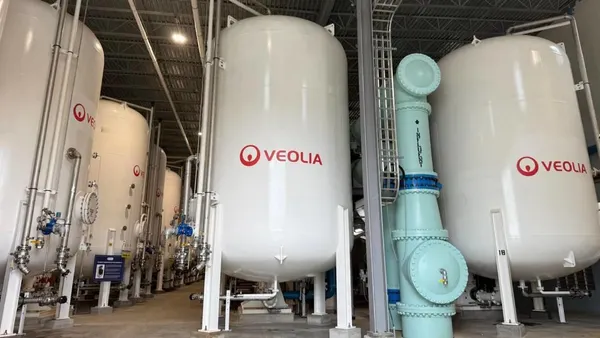Dive Brief:
- Republic Services recently stated in a report, prepared by Resource Recycling Systems, that 12% of the plastics it manages (specifically #3, 4, 6 and 7) "currently have limited or no end markets" and are generally disposed. Plastics account for 7.7% of the total recyclables marketed by the company.
- As previously reported, the company has consolidated down to 79 MRFs within the past year and invested $34 million across 39 of those facilities in 2019. Republic describes 34% of its facilities as "state of the art," 32% as "recently upgraded" and 32% as slated for upgrades within the next three years. The remainder are described as low-volume facilities.
- Republic said it supports extended producer responsibility (EPR) policies with multiple qualifications such as maintaining the existing infrastructure and control of recycling systems; considering end market development, including minimum recycled content standards and product design; directing funding to programs versus municipalities; and placing a stewardship responsibility organization in control of the program, with participation from the recycling sector.
Dive Insight:
As pressure builds to find a solution to the current status quo around plastics management, the recycling industry is increasingly being asked how it will play a part. This report, and another previously released by Waste Management, were the result of shareholder resolutions led by As You Sow.
The California-based nonprofit has pushed many related resolutions with manufacturers and food service companies, calling on them to take action around plastic. It targeted the waste industry for the first time in an effort to gain new information about the recycling system to inform future discussions with major brands. Like the Waste Management report, though in less detail, Republic's report outlined general trends around recovery and end markets for common plastics it recovers such as PET, HDPE and PP.
“My hope was that this would inform the companies that I think are down the road indeed more responsible," said Conrad MacKerron, vice president at As You Sow, in reference to packaging producers or users. While MacKerron still sees recycling companies as a key part of the process, he reiterated more onus is on brands than the industry. “They had no role in creating it, and a lot of it is problematic, and so it should go back to the companies who put it on the market to say either we’re going to redesign it or find a way to recycle it."
MacKerron does see untapped opportunity in the current recycling infrastructure to potentially capture more material. For example, he questioned whether Republic's MRF consolidation led to a decline in access for any customers. MacKerron also questioned why Republic continues to accept certain mixed plastics which the company's report notes are generally destined for disposal.
“There should be much more discussion about what’s the reason for that," he said. "Is it because they’re locked into contracts with cities and want this collected regardless, or are they just doing it in hopes that there will be markets in the future?"
A Republic spokesperson said that "generally, consolidation of facilities has not affected overall volume processed." The company also added context that "non-marketable plastics represent less than 1% of material received" and said this is largely "made up of film and flexible packaging - material that is not acceptable within most current contracts but still received in curbside loads." The company said education remains a focus, and in the report it also said "we are actively analyzing multiple business models to help drive higher recovery and circularity and will disclose additional information in the future as these programs mature."
The other goal of these reports was to clarify policy positions, in part due to a split between the two companies over a major California bill in 2019. Both said they support minimum recycled content policies, and gave qualified support for EPR in some cases.
According to the Product Stewardship Institute (PSI), this reflects a broader trend of companies in multiple sectors starting to "shed their staunch opposition" to the concept.
"Republic’s support for packaging EPR reflects a significant change in the waste management industry’s position over the past year equal to the seismic shift we have seen from producers," said Scott Cassell, CEO of PSI, via email.
"Republic’s position is consistent with those of haulers and recyclers around the country who understandably want to protect their investments made in existing infrastructure. The conversations taking place nationally and in states around the country bode well for attaining our joint goal to achieve a unified and comprehensive recycling system that is strengthened, expanded, and financially sustainable."
Next year is expected to bring multiple new state and federal EPR proposals, as well as a new round of shareholder resolutions. MacKerron said As You Sow is planning a "second wave" of requests to major packaging producers and users in the coming months. Drawing in part on a Pew Charitable Trust study, the group plans to ask these companies to "up the ante and talk about overall cuts in plastic" that go well beyond existing commitments.











